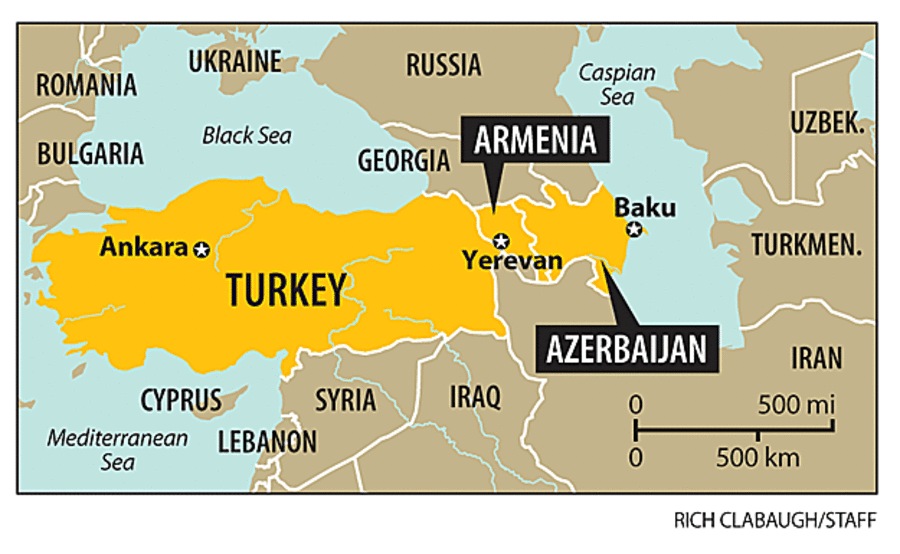Turkey and Armenia take step toward diplomatic ties
Loading...
| Istanbul
In what could signal a watershed moment for the troubled Caucasus region, Turkey and Armenia are expected to sign a set of protocols in Zurich Saturday that will lead toward the renewal of diplomatic relations after decades of hostility.
Along with the Turkish and Armenian foreign ministers, US Secretary of State Hillary Clinton and her French and Russian counterparts are expected to attend the signing ceremony.
But experts warn that serious hurdles stand in the way of the two countries actually opening up their borders.
Ankara and Yerevan broke off relations in 1993 when Turkey closed its border with Armenia after it invaded the Azerbaijani territory of Nagorno-Karabakh. Turkey is Azerbaijan's strongest ally. But the animosity goes backs decades further to what Armenia alleges was the genocide of an estimated 1.5 million Armenians under the Ottoman Turks during World War I.
Turkey admits a significantly lower number of Armenians were killed, but fiercely rejects suggestions that the killings were genocide. Ankara argues the deaths were a result of a civil uprising when Armenians joined forces with invading Russians.
Protocols may not pass in parliaments
The protocols to be signed call for the renewal of diplomatic ties, the opening of the common border, and the establishment of a historical commission to investigate the events during World War I.
The only catch, analysts point out, is that the protocols will only go into effect once the parliaments in both countries ratify them. In both Turkey and Armenia, domestic opposition could stand in the way of that happening.
"The road to restoring Turkish-Armenian relations is rocky," says Amanda Akcakoca, a Turkey expert at the European Policy Centre, a Brussels-based think tank. "Signing it is not the same thing as having it ratified in parliament. That's going to be the hard part."
In Turkey, the Nagorno-Karabakh issue could stand in the way of the protocols' ratification. Ankara imposed its economic blockade on Armenia in 1993 to support Baku's efforts to retain control over Karabakh.
During a May 14 address to the Azerbaijani parliament, Turkish Prime Minister Recep Tayyip Erdogan declared "that the border between Turkey and Armenia will be open only after the full liberation of Azerbaijani occupied territories."
Although the recently released protocols make no mention of a linkage between the normalization of Turkish-Armenian ties and the Nagorno-Karabakh peace process, parliamentarians from the ruling Justice and Development Party (AKP) have warned that it would be hard to pass the protocols without any progress on Nagorno-Karabakh.
Meanwhile, as it deals with Turkey, the Armenian government has had to contend with strong opposition, both domestically and from its large diaspora, which is concerned that Turkey is getting a free pass on the genocide issue.
Reconciliation boosts both countries in region
Observers say restoring relations with Turkey would bring Armenia out of its isolation in the region and could provide the cash-strapped country with new economic opportunities.
For Turkey, an EU-candidate country that has ambitions to play a larger political and diplomatic role in the surrounding region and to establish itself as an important energy transit route, restoring ties with Armenia is also critical.
"The invasion of Georgia last summer really concentrated minds in the region. Energy routes are the biggest game in town, and you need security and stability and access for that. Restoring relations with Armenia can create all kinds of synergy for regional cooperation and stability," says Semih Idiz, a foreign affairs columnist for the Turkish daily newspaper Milliyet.
"Restoring relations brings more credibility for the role that Turkey wants to play in the region. It brings credibility to the vision of zero problems with neighbors and for cooperating in the region and Turkey gains credibility in terms of its EU dimension."






